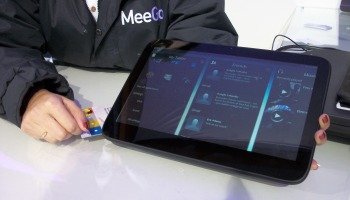Intel’s chief executive Paul Otellini is seeking new partners for the MeeGo mobile operating system, and claimed Microsoft bought Nokia’s support for Windows Phone 7.
In a meeting with analysts in London, which was accessed by Reuters, Otellini said that Nokia’s decision was a financial one: Nokia’s boss Stephen Elop had received “incredible offers – money” from Google and Microsoft to switch, he said. Launched a year ago, MeeGo was supposed to be Nokia’s next flagship, but the phone maker’s departure left Intel demonstrating MeeGo on its own at Mobile World Congress.
Financial Reason?
Elop has already confirmed that the decision to opt for Windows Phone 7 is worth billions to the Finnish handset maker, and the Nokia CEO has already faced down a small shareholder rebellion over the issue.
“I wouldn’t have made the decision he made, I would probably have gone to Android if I were him,” Otellini was quoted as saying. “MeeGo would have been the best strategy but he concluded he couldn’t afford it.”
G oogle’s chairman Eric Schmidt said he had been wooing Nokia, too, before the decision was announced, with a series of extensive talks. Otellini’s implication is that Microsoft won because it had the biggest cheque book.
oogle’s chairman Eric Schmidt said he had been wooing Nokia, too, before the decision was announced, with a series of extensive talks. Otellini’s implication is that Microsoft won because it had the biggest cheque book.
Otellini disputed the Elop’s argument that it would have been difficult for Nokia to differentiate itself from other Android players, if it opted for Android instead of Windows Phone 7.
Partner Hunt
“It would have been less hard on Android, on MeeGo he could have done it,” Otellini said. “We will find another partner. The carriers still want a third ecosystem and the carriers want an open ecosystem, and that’s the thing that drives our motivation,” he said.
This echoes Otellini’s earlier bullish comments at Mobile World Congress in Barcelona. “I don’t see that Nokia changing its strategy changes the industry strategy,” Otellini told Bloomberg. “The operators still look for an open, operator-friendly operating system.”
MeeGo made its original debut at Mobile World Congress in 2010, but Intel waited nine months before bringing AppUp, the platform’s application store, out of beta.
The interface divides content into touch-activated vertical columns loaded with the user’s videos, music, contacts and the like. eWEEK Europe has video demonstration here, showing these vertical columns.
Despite the bullish statements however, Intel will have to move quickly. Windows Phone 7 has so far been a slow seller, and Nokia devices running the OS are only expected to appear sometime next year. But in the meantime MeeGo faces substantial competition from the likes of Android, Apple’s iOS, and Research In Motion’s BlackBerry franchise.
That said, Intel expects tablets running MeeGo to begin shipping this year, followed by several smartphones.
ARM Criticism
Otellini also used the London conference to hit out at predictions that tablets will hurt or severely impact the PC market.
“(The view that) ‘PCs are dead and tablets are going to eat our lunch and there’s no growth in the PC market’, let me just say ‘bunk’ to that,” Otellini said.
And the Intel boss also used the opportunity to lash out at British chip designer ARM, whose chip designs dominate the smartphone market, a sector that Intel is seeking to enter.
Otellini said one problem with the perceived Intel versus ARM battle was that there was no ARM, in the sense that ARM’s chips were made by 1,200 licensees. “There’s no architecture consistency,” he said. “It is a big expensive, hard job to create persistence in your architecture over multiple generations: that’s what we do exceptionally well.”
He also dismissed ARM’s prospects in the server market.
“I don’t see anytime soon ARM having the software capability, the computer architecture, the transistor performance to be able to become a factor in servers,” Otellini was quoted by Reuters as saying.
“AMD is much more potent as a server competitor than the ARM guys ever will be,” he said.




